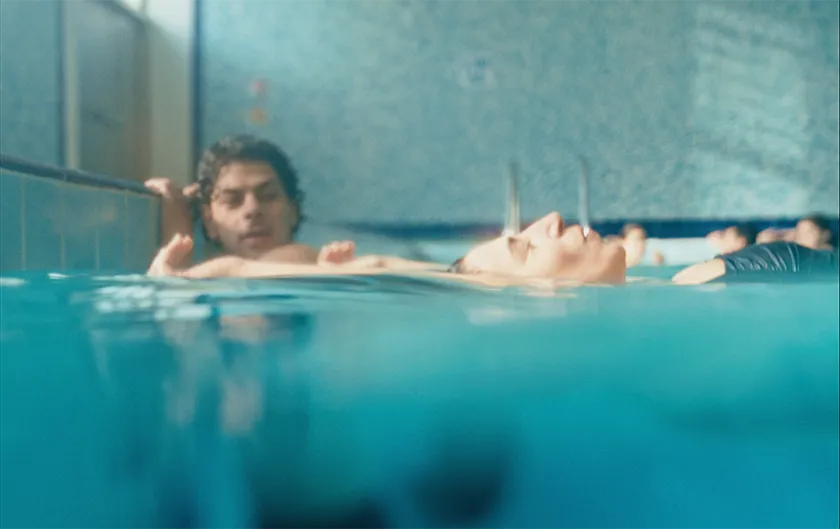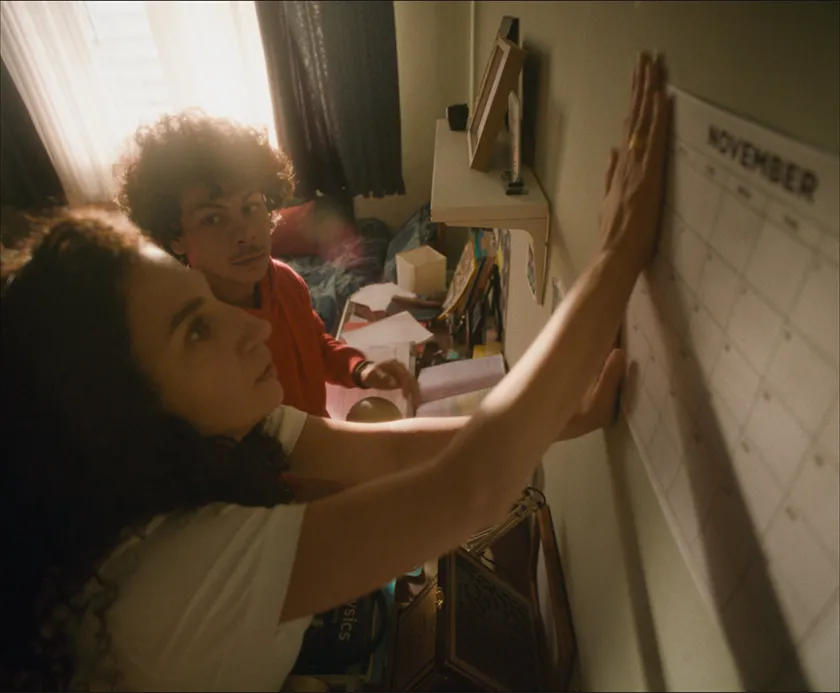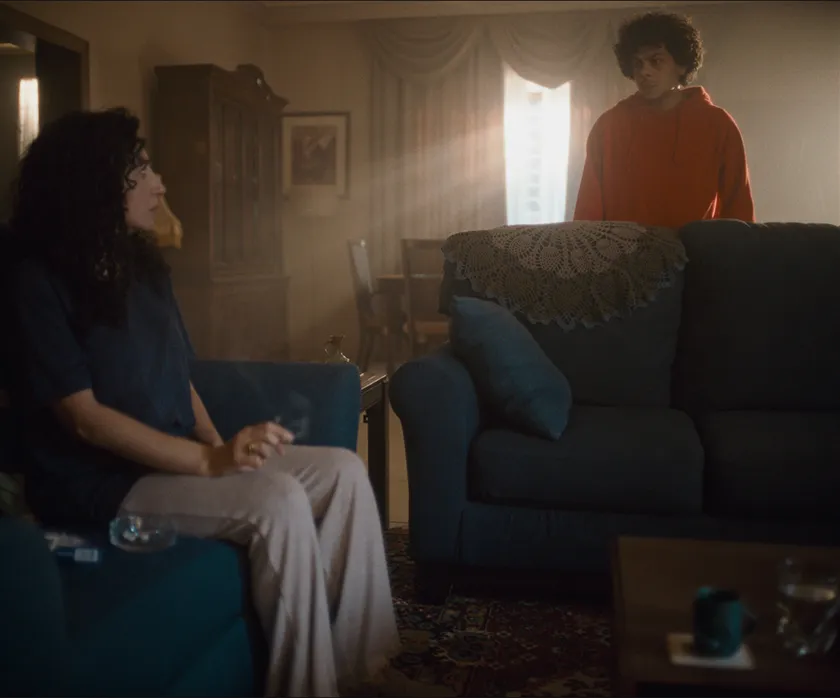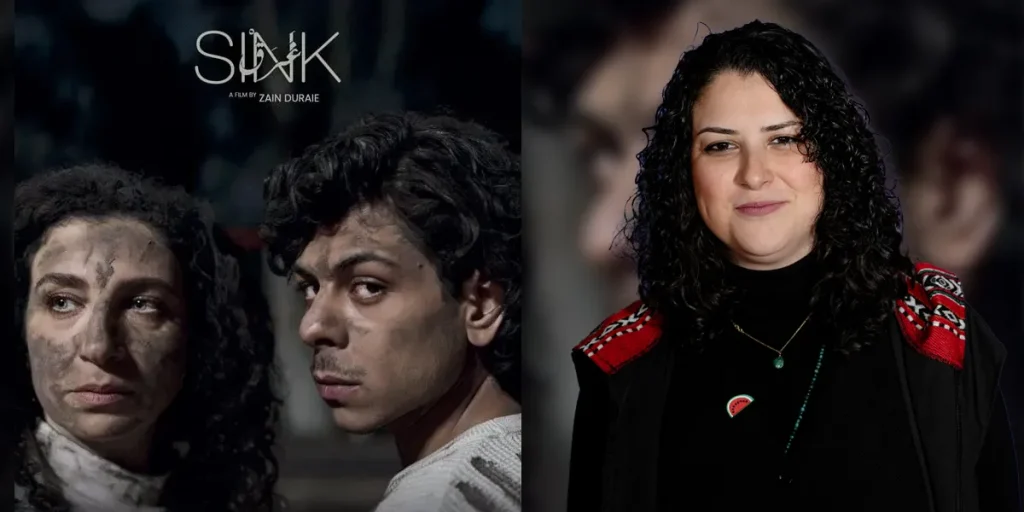In this interview, writer-director Zain Duraie tells us about her feature debut Sink (Gharaq), which was screened at the BFI London Film Festival.
When the 17-years-old Basil (Mohammad Nizar, of Selahy) is suspended from high school after an outburst in front of a teacher due to an undiagnosed mental illness, his mother Nadia (Clara Khoury, of The Voice of Hind Rajab) is determined to support him at all costs. But as her husband Jalal (Wissam Tobaileh) leaves to attend an event with their two two younger sons, Amer (Anton Qasir) and Dima (Tara Al Rifai), Nadia and Basil’s relationship evolves, eventually taking a troubling turn. As Basil’s mental health worsens, Nadia will soon have to realize that her love and guidance aren’t be enough.
Helmed by two fantastic lead performances and impressive technical execution, the Jordan-set Sink (Gharaq) is a nuanced, thought-provoking film that shines a spotlight on mental health but never forgets to put its characters first. By successfully blending very different tones and genres, writer-director Zain Duraie and the creative team behind the movie manage to craft a central relationship that feels authentic, raw, and unpredictable, taking us on a journey that will haunt you long after the credit roll.
After a World Premiere at TIFF, Sink (Gharaq) was screened at the 2025 BFI London Film Festival, where it competed for the Sutherland Award in the First Feature Competition strand. At LFF, we spoke with Zain Duraie about how the project came to be, the personal story it tells, casting and working with Mohammad Nizar and Clara Kohury, key scenes and themes of the movie, and more. Read the interview below!
Zain Duraie on Bringing Sink to the BFI London Film Festival, and ‘Making the Film She Wanted to Make’
Congratulations for this fantastic film! What does it feel like to bring Sink to the BFI London Film Festival?
Zain Duraie: I’m really excited. We’re fully sold out. Honestly, I didn’t expect to be in the Sutherland Award competition; I thought it’d be screened in one of the Strands. Kristy Matheson [the Director of the festival] wrote me this beautiful email that made me so happy, just saying how much she loved the film, and this bond between mother and son. They were mostly really impressed by the performances. I don’t think this film is everybody’s cup of tea, but I hope people will like it.
This is your first feature as a director. Can you tell us about the journey of getting it made?
Z. D.: The trouble we faced with this film was really immense, because when we would go to French funding, for example, there was a line that was driving me crazy: it was that the movie was not Jordanian enough. They’d expect the mom to be veiled, or the film to explicitly draw attention to the aspect of ignorance, or the lack of help with mental illness. I think they wanted me to write a different story.
This film is very personal to me; It’s about someone close to me, whose privacy I’m protecting. [The funding companies] knew the project was very close to me, because they had read my statement, but still, [they would keep making these requests]. It wasn’t just France; I’d say Europe in general was really not very easy with me. Yes, making a first feature like this is very risky, and it’s challenging; it’s not the “typical” film that would come out of Jordan. People expected me to make the film more about social class, or religion, and the Muslim society.
But that wasn’t my focus, and that’s not the world I grew up in; I wanted to do something that would be close to what I felt. All the elements I added – like the animals, for example – were all things I had dreamt of; I didn’t want the film to be “magical”. But that was very difficult, because [the funding companies] kept trying to to stereotype the film: they wanted it to be agenda-driven, and to be more like a postcard. My producer believed in me, and in my story. He said, ‘You know what, Zain? Make the film that you want to make. Don’t make the film that the funders want just so we can get money. We’ll manage without them’. My producer managed to get all the money from the region on his own, and he’s a first-time producer. Nobody really knew him as a main producer, and he just pulled it off.
That’s amazing! So did it take you a long time to make the film?
Z.D.: With writing and everything? Yeah, I took us about six years. I started writing in 2020, and with the COVID pandemic, the economy was really down, so it was even more difficult to get money. We really shot it with less than a million dollars, which was challenging.
Sink is a Mirror, a Wound, a Love Letter to Motherhood, and a ‘Human’ Story About Mental Health
When did you first get the idea to make the film? Is there a specific scene or theme that came to your mind first, when you started writing it?
Zain Duraie: As a filmmaker and as an auteur, when you’re writing a film, you’re also discovering parts of yourself; you’re creating a story out of some sort of pain that you’ve experienced. I also felt that nobody in the Arab world spoke about the stigma of mental health. Nobody explored relationships between two people without having this exotic environment around them [that would make the film feel more ‘Arab’]. That’s not something I cared about, as I was just trying to tell a story.
To me, this film is a mirror; It’s a wound. It’s a love letter that I wanted to write, and it’s also an ode to motherhood. I’m very interested in women’s stories, and in women characters. My focus was making a film about an ill child and his mother.

Of course, I was very inspired by Xavier Dolan’s Mommy [2014], which I really like, and which truly inspired my writing process. When I first saw this film in 2014, I said to myself, ‘I want to make something like that, but maybe more quiet.’
I think I was really discovering myself with this film, and I wanted to just share this pain to others out there, because it’s about someone who’s very dear to me. I wanted to just share that pain with the world, so it was also a therapeutic experience for me.
I imagine it will be a therapeutic experience for the audience too!
Z.D.: In Toronto, people were so emotional. One audience member came to me and said, ‘I have schizophrenia, and I just want to thank you for making us look human. Thank you for not making us look like the villains, or the bad people’. That’s what I wanted. I wanted to make a human story – a film about two people who are flawed, and who trying to understand each other, without having to add anything ‘exotic’ just so I could get some money. I think we fail as artists if we do that.
Zain Duraie on the Sound Design in Sink
I was reading your director’s statements, where you said that you wanted to make a film where ‘the silence would feel heavier than the illness itself’. I was so impressed by this aspect of the movie.
Zain Duraie: I’m someone who writes with sound, so all my scenes have a sound element in them. I think it’s really important, in filmmaking, to include these elements when you’re writing: not just images, but also sound, and even music, as sometimes you can even imagine the music that you want. Israel Bañuelos, our sound designer, is Mexican and lives in Estonia; I went to Tallinn and worked with him in the studio. He’s very talented, and he really understood the story.
With the sound design, I wanted to be inside the characters’s heads. I wanted [the audience] to feel what they’re feeling in a very subtle way; I think it’s a major part of filmmaking. You wrote in your review that the ‘sound design’ is the star of the film, didn’t you?
I did, yes!
Z.D.: Yeah, he’s amazing. But I also want to mention my editor, Abdallah Sada, who really was a huge creative in this film. He added so much depth, and he helped me a lot with building the sound design too. He was queuing my thoughts all the time; he was a major hero in this film. Of course, so were my creative producers: my whole team was amazing. But when you’re working extensively with the editor, one-on-one, for three months, so much comes out of that.
What about your cinematographer? What was your relationship like with him?
Z.D.: Our DOP was Farouk Laâridh; it was my first time working with him. He’s so talented. He’s young: he’s my age group. We managed to build the film together in a way where I just knew this guy was the one for this movie. He knew I was going to have two different aspect ratios, and he really understood the ‘look’ I was looking for. Really, it was a creative collaboration. The film was everybody’s baby; I’m the director, but everybody gave something to it.
Mohammad Nizar & Clara Khoury, and the Central Relationship in Sink
I really love that you made this film about both the mother and the son; you show us their relationship, but also their individual journeys.
Zain Duraie: I think they complete each other. To me, this film is like a love story – a platonic one – between the mother and the son, so when we’re with him, we’re with her, and when we’re with her, we’re with him. There was something for me when I was writing that was so magical: I wanted to explore how far this boy would be willing going to go, and how far this mom would go, to stay in denial and shield herself from seeing the truth.
Because she does feel that something’s wrong, but she thinks she’s doing the right thing. We’re built in a society where we’re taught to do just that: ‘I’m just going to protect you, and I’m just going to do what’s best for you, but I’m not going to admit that things are more dangerous than they actually are’. I wanted to see how far I could go with exploring the nuance of that experience, and of this three-dimensional human that I was building in the script. And of course, the cast really helped me too, when we were in rehearsals.
We rehearsed for many months; we actually prepped Mohammad Nizar, who plays Basil, for three years! He started preparing without the script, and then I gave him the script eight months before shooting. He’s amazing.
They both are.
Z.D.: Yes, very talented actors. I was really lucky [to have them], because they were as passionate about the film as I was; the cast, the crew, and the producers… We were all on the same page, and that’s very important. Everybody was determined to make this film happen. Clara Khoury, who plays Nadia, was truly mind-blowing for me.

How did you cast Mohammad and Clara?
Z.D.: Mohammad was very easy: I didn’t audition him. I just had a coffee with him: we talked, and I just told him, ‘Okay, I think you have the role’. And he said, ‘What? But aren’t you going to ask to tape me, or something?’ I said, ‘No, it’s you.’
Oh wow. What was it about him that spoke to you?
Z.D.: I just knew he had it. When we were having coffee, we were talking about normal things – a bit about the film, but it was mostly about him. And when he was talking to me, I was just seeing my character in front of me, so I just knew it was him.
He’s so good in the film. He adds so much emotion to the role.
Z.D.: It was really tough. He also twisted his knee, actually! In the middle of the film, he was injured himself. He really suffered with making the film, but he was so dedicated to his character. He loved his character so much, and he would do anything for him. He’s just so talented. He shaped him exactly like I wanted, and he also gave a lot, especially in the dance scene [where Mohammad and Nadia go out for dinner and start dancing together]. Even I didn’t I think it was going to be this good. It was magical: I love that scene. We only shot it in four weeks.
What about Clara?
Z.D.: I actually had a different actress in mind first, but then we had some trouble, and my producer got me a list of different options. When I talked to Clara on Zoom – because she lives in U.S. – I just looked at her. I saw those green eyes and I thought, ‘Wow, imagine that with the mud at night [in one of the scenes of the film], and her eyes flaring in the night. And I knew she was talented, brilliant, and very experienced. So I just said, ‘Yeah, it’s her.’ And the chemistry test between her and Mohammad was excellent. With everybody, it was just building this family together with the kids, the husband, and everybody. It was just so organic.
Zain Duraie on Sink‘s ‘Point of No Return’, and the Hardest Scenes to Shoot
I love that you mentioned the night scene in the mud. That scene, especially the moment with the chicken, really surprised me, as it goes into some very dark territory in a way that I didn’t expect.
Zain Duraie: For me, this was the turning point of the story, because that’s when the mom is saying, ‘Okay, my son has become dangerous’. It’s one of my favorite moments in the film, and one of the scenes that make it stand out. I wanted the mom to be on the verge of losing her mind. It was her point of no return: the screen opens, everything changes, and that’s when she starts to lose it. I remember Clara asked me [while shooting that scene]: ‘Can you remind me again, why am I throwing myself in the mud?’ And it was the last three days of shooting, because we didn’t shoot chronologically. I told her: ‘You’re either playing with him, or he’s about to do something to you. And this is also you saying goodbye to him.’ So she just took a breath and she said, ‘Okay, I’m ready.’
And she’s so good in that scene!
Z.D.: Yeah, she’s amazing. I still watch that whole night sequence sometimes, and I say to myself, ‘Wow.’ I never expected it to be this magical. I wanted it to be magical, but with the limited resources we had and with everything, I just didn’t think it was going to be this good. I also had an amazing cinematographer. When you have so much talent with you, it just elevates everything.

The themes in this film can get really heavy, in terms of this family’s journey and the scariest moments you showed us. What was it like for the cast and crew? Did you work on safeguarding the cast, mental health-wise?
Z.D.: We did. The kids in my film actually didn’t really know much: they never really read the script, as they only had scenes. I prepped with the little girl [Tara Al Rifai, who plays Basil’s sister, Dima] differently; each one had their own journey. I was worried about Mohammad, because the role of Basil is very heavy: I was always checking on him to ask if he was okay. And it was really emotional: I saw my cast breaking.
*Spoiler warning in the paragraph below*
Take the scene where Basil chokes Nadia, for example. That was one of the most difficult scenes to shoot, and I was worried about [Mohammad and Clara] because they were both really drained, mentally, after all the shooting, and I didn’t know how they would perceive it. But actually, I think there was a sense of relief when we shot [the choking scene], because this film was so therapeutic for all of us. Each one of us had something that was close to us in this film: a relationship that we went through, a breakup, a heartbreak, I don’t know.
*No more spoilers from here*
Zain Duraie on Why She Makes Movies, and Her Future Projects
Why do you make movies?
Z.D.: I think as directors, we’re artists, and we all have something boiling inside of us that we just want to take out: this is why we should make films. Yes, we want to entertain the audience, of course, but I think it’s deeper than that. I think each one of us must have a pain, an ache inside us that we want share. And it’s such a competitive industry, as there are so many films about the subject you want to tell, but our pain is shared, because so many people have mutual pains. We each tell our stories differently [in a way that will reach audiences that have experienced the same kind of pain], and I think that’s why we make films.
Do you know what you will do next? Are you working on anything?
Z.D.: I have an idea I’m developing, which is about maternal instinct.
I will look out for it! Thank you so much for speaking with us!
This interview was edited for length and clarity.
Sink was screened at the BFI London Film Festival on 16-18 October, 2025. The film is currently looking for distribution.
Header credits: Director Zain Duraie (Shweta Shukla, BFI London Film Festival) / The poster for Sink (Tabi360)

